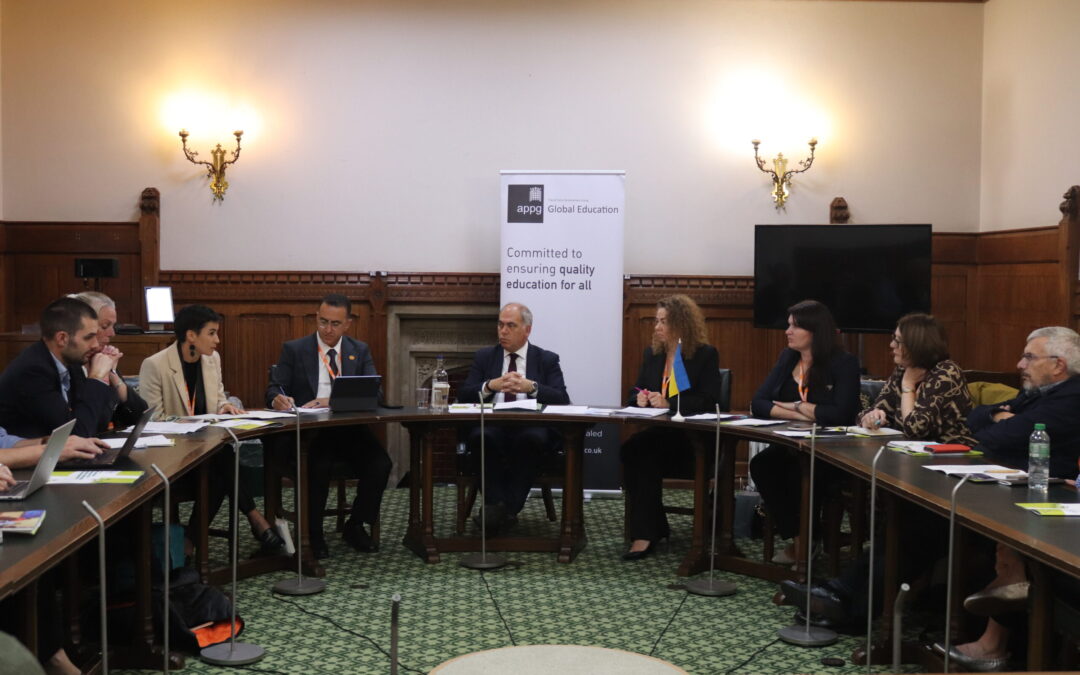On 13 October 2025, the All-Party Parliamentary Group (APPG) on Global Education, in partnership with the National Education Union (NEU), hosted a panel discussion on “Prioritising Teachers in Emergencies” to mark World Teachers’ Day. The discussion explored the challenges faced by teachers working in conflict and crisis contexts, with a focus on Gaza and Ukraine, and the vital role teachers play in maintaining learning, safety, and hope during emergencies.
The event was chaired by Bambos Charalambous MP, Chair of the APPG on Global Education. He opened by highlighting the severe pressures faced by teachers in emergencies — from school closures and unpaid salaries to overcrowded classrooms and loss of infrastructure — stressing that teachers are often the forgotten frontline workers in crisis response.
Teachers on the frontlines in Ukraine
Olga Chabaniuk, Vice-President, and Kateryna Maliuta, International Secretary of the Trade Union of Education and Science Workers of Ukraine (TUESWU), shared powerful testimonies on the realities for teachers and children living through war.
Chabaniuk described how education has become one of the many casualties of Russia’s invasion, with schools and homes under attack and more than 3,900 educational institutions damaged and 400 completely destroyed. Many schools now operate only online, with children often having less than 40 seconds to seek shelter when rockets are launched. She spoke of the immense psychological toll on children who no longer know what normal life feels like, and the loss of safety and routine that schools once provided.
Maliuta highlighted the impossible conditions for teachers who face triple workloads and some of the lowest salaries in the Ukrainian economy, often as little as 200 euros per month. This compares to an average of 500 euros per month earned by young hospitality workers. Many work across multiple shifts, up to three per day, switching between online and in-person teaching. She warned that if teachers cannot afford to stay in the profession, “the war may one day end, but the people will not remain.” She expressed deep gratitude for the solidarity and support shown by British educators and urged that international aid prioritise education, which she called “the foundation for rebuilding the future.”
Education under fire in Palestine
Saed Erziqat, General Secretary of the General Union of Palestinian Teachers (GUPT), delivered an equally moving account of how teachers in Gaza and the West Bank continue to uphold education despite almost unimaginable conditions.
In Gaza, nearly the entire education system has been decimated over the past two years, with hundreds of schools and universities damaged or destroyed, and large numbers of teachers, pupils, and professors killed. Many teachers have not been paid for months, yet continue to teach online, in temporary spaces, and through community efforts. Families often share one device among many children, with volunteers stepping in to ensure learning continues. “War can destroy buildings,” he said, “but not the love of learning.”
In the West Bank and East Jerusalem, teachers and students face daily checkpoints, restrictions, and intimidation that make access to education an act of endurance. Erziqat described the situation as not only political but deeply human: “When children are taught under bombs, their humanity shines through. This is not charity, it is justice.”
He thanked the British government for recognising the State of Palestine and called for the UK to uphold international law by supporting teachers’ salaries, rebuilding Gaza’s schools, and investigating attacks on teachers and students. He also urged that taxes and aid flows reach Palestinian institutions directly so that teachers can be paid and schools restored. His message was one of perseverance and dignity: teachers are community leaders who, even under occupation, continue to teach peace in the face of violence.
Global perspective and international responsibility
Sonja Grigt, representing Education International (EI), underlined that teachers are “the first and last line of defence” for children’s learning, safety, and hope. She shared evidence of the severe and often overlooked challenges facing teachers in emergencies worldwide, from low pay and job insecurity to safety risks and lack of training. EI has long documented the chronic underfunding of teacher salaries in crises and has recommended exploring the creation of a global fund for teachers in emergencies.
Grigt emphasised that while national governments bear primary responsibility, the international community must also act when governments cannot, such as in times of conflict. She urged the UK to use its influence to push for sustainable financing for teachers through multilateral partnerships, warning that without action, today’s short-term crises risk turning into a long-term education collapse.
The UK’s role
Louise Regan of the NEU highlighted the human impact of aid cuts on education around the world. Over 400 learning centres for Rohingya refugees have had to close, while Lebanon has the highest number of refugees per teacher globally. She called on the UK to protect funding for Global Partnership for Education (GPE) and Education Cannot Wait (ECW) and to prioritise teachers across all levels of policy, programming, and financing.
Judith Herbertson, representing the Foreign, Commonwealth and Development Office (FCDO), acknowledged the challenging financial context. She highlighted the long-term benefits of investing in education, noting that every pound spent generates twenty pounds in economic return, and reaffirmed the government’s commitment to tackling global education challenges despite constrained budgets.
The APPG on Global Education thanks all speakers and participants for their powerful contributions and reminder that teachers, the backbone of every education system, must not be forgotten in times of crisis.

